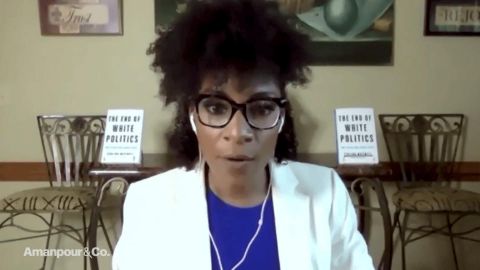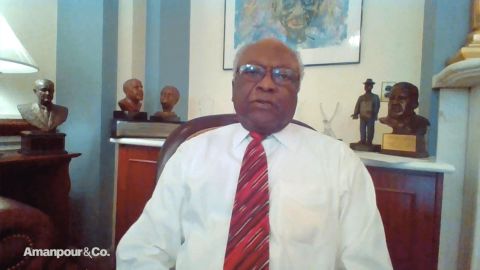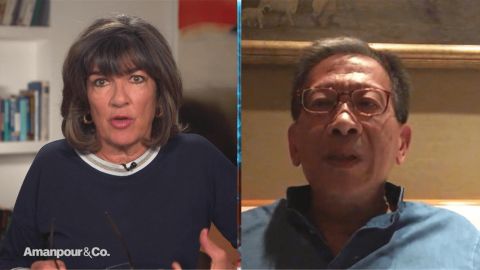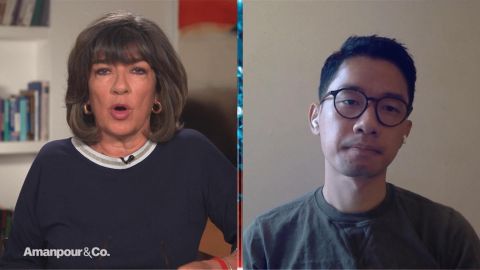Read Transcript EXPAND
CHRISTIANE AMANPOUR: Now, as the U.S. election creeps ever closer, speculation is mounting over who Democratic presidential nominee Joe Biden will pick as his running mate. Our next guest argues that it should be one of the many qualified black women in politics today. Zerlina Maxwell is co-host of the political radio show “Signal Boost” on SiriusXM. And back in 2016, she was director of progressive media for Hillary Clinton’s presidential campaign. Her new book, “The End of White Politics: How to Heal Our Liberal Divide,” argues that the Democrats’ failure to focus on communities of color could be their downfall. And here she is talking to our Michel Martin.
MICHEL MARTIN: Thanks, Christiane. Zerlina Maxwell, thanks so much for talking to us.
ZERLINA MAXWELL, SIRIUSXM RADIO: Thank you for having me.
MARTIN: You open the book with a scene that I think really captures what the book is about. You were on a panel at something called Politicon. This was in July of 2018. This is obviously after the 2016 elections, where the outcome wasn’t what you would have hoped. The panel was called “What’s Next, Liberals?” And you describe this — I’m going to set the stage for you. You call them the end of the Bernie Sanders supporter, white male, millennial and uncompromising, raucous, rowdy and quick to heckle anyone deemed insufficiently progressive. So, let’s set the scene here. You’re trying to get your points across about why you think 2016 ended as it did. You give this radical statement. All of the Democratic candidates will need to do a better job of speaking to and about the issues that black women in particular care about the most if they want to win the 2020 Democratic nomination, and that’s why Bernie didn’t win in 2016. Oh, my goodness. What a shocker.
MAXWELL: Yes.
MARTIN: But then what happened?
MAXWELL: I got booed. I was booed and heckled. And they — it was very hostile. And to be clear, I went to Politicon in 2019. The same thing, the same thing happened. I was booed for articulating very similar points. The mention of Amy Klobuchar’s name got boos from those same folks. And so there’s a gender piece, but there’s also a race piece that I was trying to highlight, because, for so long, black women have been electing Democrats,. Doug Jones is in the Senate because of black women organizing, specifically on their own, to keep a child molester, Roy Moore, alleged child molester, out of the United States Senate. And I think that to the credit of those black women, they didn’t need to be told to organize to prevent that reality from happening. They knew that Doug Jones had a history of prosecuting the murders of the four little girls in Birmingham. And so they — he had a connection to that community. And I think that more Democrats should look to that example and the example like Stacey Abrams, folks who really go directly to black women, and essentially engage with activists and community leaders who are already doing the work.
MARTIN: I take it that was a eureka moment for you at that meeting in July 2018. Why was that a eureka moment for you? What did that crystallize for you?
MAXWELL: Well, I felt like they were things that were very obvious to me, that were not obvious to those who were around me. I think that the folks in the room, particularly the white men in the room, they think they’re the majority of the base. They think that they are the most in important part of the base. And I was just trying to demonstrate that that was no longer true. It’s not going to be true going forward, as demographic shift and the coalitions become different. Now we’re in a moment where we have to focus on the specific issues, so that we can build this whole — rebuild this Obama-esque coalition. And those folks who are a part of it, but they don’t even want me in their tent. If I’m going to get booed just by pointing out some of the ways in which we can improve our messaging towards communities of color, and you’re going to boo me, I think that you need to do some reflection on why you feel hostility towards a woman of color, a black woman making that point.
MARTIN: You make a big point in the book that all politics is really identity right now. And I don’t — identity politics has taken on kind of a bad connotation in political circles, at least some political circles. You say that that’s wrong. Why is that wrong?
MAXWELL: Well, first of all, Stacey Abrams, I talked to her recently, and we were just laughing about the fact that, of course, a term that was coined by black feminist in 1977 would all of a sudden be a bad thing, right, once it becomes more of the part of the mainstream conversation. As soon as people start being like, oh, maybe that’s the thing we should pay attention to, it is demonized by those who understand the efficacy of leaning into identity-based politics, as the coalitions of people of color and those demographics are shifting. And so what I think and what I’m trying to say in the book is that Donald Trump has exposed the fact that what we have been doing in America is essentially white identity politics the whole time. We have particularly been leaning into that in this moment, as the president runs an explicitly racist campaign, targeting a particular segment of his base that he thinks responds to those kinds of messages. And they are. And I think that what we need to understand on the progressive side is that we cannot fall into this notion that identity- based politics is bad, because they understand the demographic shifts. That’s why they’re suppressing the vote. That’s why there are voter I.D. laws targeting communities. We need to understand that the math and the demographics are on our side, and that identity-based politics is an authentic way to speak to those communities. I’m going to quote Stacey Abrams again, just because she’s the smartest person this particular issue, I think, in this moment. But she says dentity politics is sort of like the flip side of, I don’t see color. It’s like, I see you, right? And I feel like that’s a really powerful validation to communities who have been historically marginalized and ignored by the political establishment.
MARTIN: It’s interesting you say that President Trump and his whole reason for being in politics is white identity politics, but that’s a term you just don’t hear very often. I mean, we talk — people talk about identity politics. They are generally talking about people of color, women, to some extent, but, generally, people of color. Why is that?
MAXWELL: Because we default to whiteness. We don’t see whiteness as an identity. And it is an identity. And I think Donald Trump finally exposed that to a lot of white Americans who didn’t have to think about race, who didn’t have to think about gender or the intersection of identities, and how that is impacting people. I think COVID has made that clear to a lot of people. And you see this racial reckoning happening in all different sectors as a result of people just thinking things through in a different way. They’re noticing more inequities in systems. And that’s important, because that means that, if white Americans can understand the ways in which their whiteness benefits them in ways they didn’t realize, it’s those things that they didn’t have to think about. They didn’t have to think about going for a jog and maybe getting shot because you were mistaken for a burglar. That’s just not an experience that a white person is having. And that’s a privilege, but that doesn’t make you a racist. That just means that you have certain privileges. I have certain privileges, I’m able-bodied. I have a certain level of education. And I’m socioeconomically pretty privileged. And I would say that that’s OK. I mean, I can just identify those things about myself. And that doesn’t mean that I’m a bad person or that somebody that has, like, white privilege is a racist. It just means that you have to have an understanding of how those privileges benefit you. And then you need to reach back and help other people. And that’s fundamentally, I think, my perspective on most things, is try to help.
MARTIN: The core of your argument, the core of your book, is that Democrats need to start speaking intentionally to the concerns, the real and lived experience, particularly of people of color, but particularly women of color, because that’s the new base. And you say that they’re not doing that. But what do you say to people who argue that really it should be policy first, because policy first is how you bring everybody in? I mean, you could argue that Barack Obama could never get away from his skin, his face, his name and so forth, but that he spoke policy first. And because he was policy first, he was able to bring in people who, frankly, weren’t — might not have been as comfortable with a man of color in that position, and that this is a way that women, everybody, people who have traditionally been marginalized, that is how you bring people in, is policy first? That is essentially the Bernie Sanders argument. Why is that wrong?
MAXWELL: I look at it a little differently in terms of how you weave the policy and the message, but also consider who the messengers are. So, for example, I think that Bernie Sanders did an excellent job of changing the debate about income inequality, and the impact of corporations on our politics, and Wall Street and their abuses. But I feel like he always stopped short of articulating in detail how he was going to get us to that vision. And so I think that it’s a combination. You have to both message to — directly to communities, understanding how policies are impacting them specifically. So, if you’re talking about equal pay with a group of black women, you better understand how it impacts them in a different way than it does white women, and the same as for Latino women. So, I think you’re weaving why you need the policy, and how it’s going to be tailored to that community. And then you’re talking to them in language they understand. And maybe that means you’re talking to them on a social media platform they actually use. Maybe it means you’re doing I — do live with D-Nice, which is something that the Biden campaign just did the other day. So I think you have to both have the message weaved in with the policy.
MARTIN: Well, that brings us to Joe Biden.
MAXWELL: Yes.
MARTIN: I mean, you wrote this book really quickly. I mean, it’s pretty timely. And you wrote it over the past year. But the world has changed an awful lot within a short period of time, and now Joe Biden is — the former vice president is the presumptive nominee. I take it you’re not a fan. I’m just going to read the book here.
(LAUGHTER)
MARTIN: You say: “The inability of Biden, Sanders and other white Democrats to even speak authentically about race and acknowledge white privilege is an Achilles’ heel that needs to be tested.” So, what now?
MAXWELL: Well, I would say that I’m a fan of Vice President Joe Biden, in the sense that I do believe him when he says he wants to be a transitional figure to sort of a new generation of Democrats, and maybe they look more like the Squad than the traditional establishment. So I believe that when he says that. So I can’t say that I’m not a fan. And I have met the vice president, and he’s very nice and genuine and open. And so I’m a fan of him as a person. I think that his policy record, though, I do have some issues. And I just want him to fully account for those issues, because, once you do that, then you can talk about what your vision is for the future. But if you haven’t accounted for the consequences of the policies that you did in the past, then why should we trust you that you’re going to be able to do anything good for us in the future, or that we should trust you on the ideas that you do have to build a different future, if you can’t account for that? I mean, one of the points I make in the book about how some of the candidates who didn’t gain traction, one of them was Kamala Harris. And that was largely due to her inability to fund-raise as much as some of the other candidates, like a Mayor Pete, for example, but also the criticism of her that she was a cop. And I was like, Joe Biden wrote the crime bill that Kamala Harris, as a district attorney and later an attorney general, was — like, those were the laws that she was implementing.
MARTIN: And that’s where his vice presidential pick becomes super important. So, Zerlina, who?
MAXWELL: I just want to say that it is impressive to see a list of qualified black women and women of color and just women broadly that he has to choose from. And that’s really an exciting moment. So, I like to sort of pause and say, this is a moment. But then, also, I think a black woman in particular would bring in a perspective that he needs. He needs that perspective. He needs somebody to give him some real talk about the impact of the crime bill on communities of color, and how it ripped apart families that are still actually feeling the consequences of that.
MARTIN: You book is a fun read.
MAXWELL: Thank you.
MARTIN: But — it was fun. I mean, you obviously love politics, and you kind of love the game and you like the people. And — but, in a way, it’s really depressing, to be honest, because…
MAXWELL: Well, I don’t want to be depress…
MARTIN: Well, no, I mean, I’m just — the reason I say that is, you’re saying — you describe — and we only have time to sort of talk about like a fraction of it here — but the kind of — the disrespect, kind of diminishment. I know the vogue word is microaggressions. In your case, there are actual regressions directed at you and other people working in the space. I mean, it’s not like it’s a new thing to have accomplished African-American women in politics, I mean, Shirley Chisholm, Barbara Jordan.
MAXWELL: Right.
MARTIN: I mean, call the roll. You have more, as you point out, Kamala Harris, Carol Moseley Braun. But the fact that you have to fight so hard to be heard, as you describe in the book, and we’re talking about people who are supposed to be on your side, because your book really is about Democrats more broadly and progressives in particular.
MAXWELL: That’s right.
MARTIN: What does that say?
MAXWELL: Well, I mean, what I always try to do is create space, so that other people who are like me can be heard also. So I never want to be the only one in the room talking. I think what I really wanted to do with the book is to get people to think about this differently. They really need to do — like, you just — we have time, unless you have small kids. We’re in quarantine. We have a moment to sit down and think about some of the ways in which we’re doing this wrong, how we’re not supporting each other. I mean, the fact that we have to tell people to wear masks, at this point, I feel like not wearing a mask is almost like a MAGA hat. It’s like, OK, I know how you feel about black and brown people if you don’t wear a mask, because you know that we’re just proportionately killed by this virus. And now you’re going out and flaunting the fact that you don’t think this is real. Even — I have five extended family members who have died.
MARTIN: I’m sorry.
MAXWELL: Cousins. Nobody in my immediate family, but I have an immune- compromised mother. And so it’s like terrifying every second, right? And so I think that the reality is so visceral in this moment that it’s like — it’s unfortunate that it’s hard. I have to yell sometimes to be heard, or I have to write a book saying, move out the way. This is what I have to say. And I hope people hear me. But, at the end of the day, I want other black women to see politics as a career also, because our voices are needed in this space. They’re — Hillary Clinton hired more black women than any presidential, but there could have been double, and it still probably wouldn’t have been enough. And I think we have to be in every room, in every department. We have to be building the Web site. As you know, Mina (ph) is one of the coders who built the Web site, and Ida is the one who did “I’m With Her” and that logo. And so both of them are black woman. So, I feel like we have to see politics as a job. And it’s a career as well, because there’s always a campaign. I mean, I don’t know what’s going to happen if Donald Trump wins again — caveat — but I do think I want to create space with this book. And that’s why I think it is depressing, definitely, to your point about being drowned out by boos. But I know that my clarity in sort of the vision that I’m pointing towards, which is just backed up by data, I think some people will see that. And then, hopefully, I have created a space, so other women of color, particularly other black women, can be — can be heard also.
MARTIN: Zerlina Maxwell, thanks so much for talking with us today.
MAXWELL: Thank you for having me.
About This Episode EXPAND
U.S. House Majority Whip Rep. James Clyburn (D-SC) reacts to the federal crackdown on protesters in Portland. Pro-democracy activist Nathan Law and Alan Hoo, vice chair of Hong Kong’s Liberal Party, respond to the UK’s suspension of its extradition treaty with Hong Kong. Zerlina Maxwell joins Michel Martin to discuss her new book “The End of White Politics.”
LEARN MORE



